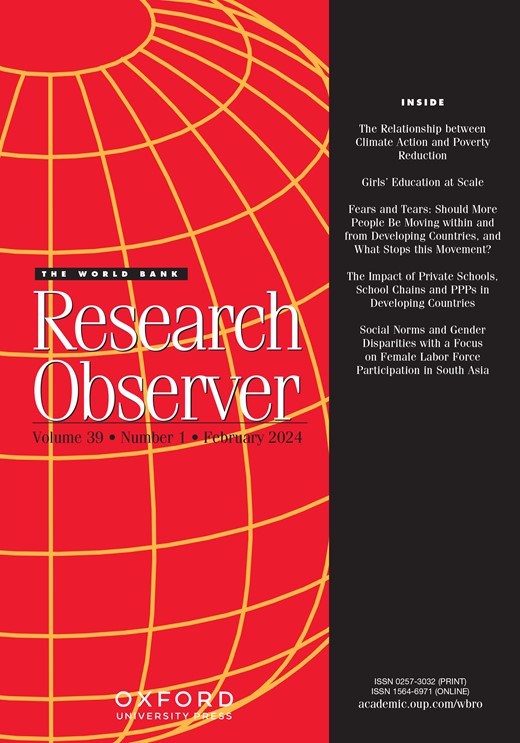Decentralization of Health and Education in Developing Countries: A Quality-Adjusted Review of the Empirical Literature
IF 3.3
1区 经济学
Q1 DEVELOPMENT STUDIES
引用次数: 89
Abstract
We review empirical evidence on the ability of decentralization to enhance preference matching and technical efficiency in the provision of health and education in developing countries. Many influential surveys have found that the empirical evidence of decentralization's effects on service delivery is weak, incomplete, and often contradictory. Our own unweighted reading of the literature concurs. However, when we organize quantitative evidence first by substantive theme, and then—crucially—by empirical quality and the credibility of its identification strategy, clear patterns emerge. Higher-quality evidence indicates that decentralization increases technical efficiency across a variety of public services, from student test scores to infant mortality rates. Decentralization also improves preference matching in education, and can do so in health under certain conditions, although there is less evidence for both. We discuss individual studies in some detail. Weighting by quality is especially important when quantitative evidence informs policy-making. Firmer conclusions will require an increased focus on research design, and a deeper examination into the prerequisites and mechanisms of successful reforms.发展中国家卫生和教育的权力下放:对经验文献的质量调整评论
我们审查了关于权力下放在发展中国家提供保健和教育方面加强偏好匹配和技术效率的能力的经验证据。许多有影响力的调查发现,关于权力下放对服务提供的影响的经验证据薄弱、不完整,而且往往相互矛盾。我们自己对文献的不加权衡的阅读也同意这种观点。然而,当我们首先根据实质性主题组织定量证据,然后至关重要的是根据经验质量和其识别策略的可信度组织定量证据时,清晰的模式就出现了。更高质量的证据表明,权力下放提高了从学生考试成绩到婴儿死亡率等各种公共服务的技术效率。权力下放还可以改善教育方面的偏好匹配,在某些条件下也可以在保健方面做到这一点,尽管两者的证据较少。我们会详细讨论个别研究。当定量证据为决策提供信息时,质量加权尤为重要。更坚定的结论将需要更加注重研究设计,并更深入地研究成功改革的先决条件和机制。
本文章由计算机程序翻译,如有差异,请以英文原文为准。
求助全文
约1分钟内获得全文
求助全文
来源期刊

World Bank Research Observer
Multiple-
CiteScore
12.60
自引率
1.20%
发文量
8
期刊介绍:
The World Bank Journals, including the Research Observer, boast the largest circulation among economics titles. The Research Observer is distributed freely to over 9,100 subscribers in non-OECD countries. Geared towards informing nonspecialist readers about research within and outside the Bank, it covers areas of economics relevant for development policy. Intended for policymakers, project officers, journalists, and educators, its surveys and overviews require only minimal background in economic analysis. Articles are not sent to referees but are assessed and approved by the Editorial Board, including distinguished economists from outside the Bank. The Observer has around 1,500 subscribers in OECD countries and nearly 10,000 subscribers in developing countries.
 求助内容:
求助内容: 应助结果提醒方式:
应助结果提醒方式:


